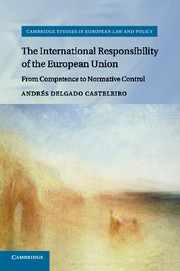Book contents
- Frontmatter
- Contents
- Series Editors' Preface
- Acknowledgements
- Introduction
- 1 The EU's Normative Control and International Responsibility
- 2 Codifying of the Responsibility of International Organizations (I): The Impact of ARIO's Rules of Attribution on the EU
- 3 Codifying of the Responsibility of International Organizations (II): The Impact of ARIO's Rules of Responsibility on the EU
- 4 EU Declarations of Competence to Multilateral Agreements: A Useful Internal Reference Base?
- 5 The Apportionment of the EU's International Responsibility in International Environmental Law: The International Application of EU Declarations of Competence
- 6 The EU's Normative Control and International Responsibility: The WTO Dispute Settlement System
- 7 Normative Control in the EU and the Responsibility of Member States: An Analysis of the Responsibility of the EU in International Investment Law
- Conclusions
- Bibliography
- Index
1 - The EU's Normative Control and International Responsibility
Published online by Cambridge University Press: 05 September 2016
- Frontmatter
- Contents
- Series Editors' Preface
- Acknowledgements
- Introduction
- 1 The EU's Normative Control and International Responsibility
- 2 Codifying of the Responsibility of International Organizations (I): The Impact of ARIO's Rules of Attribution on the EU
- 3 Codifying of the Responsibility of International Organizations (II): The Impact of ARIO's Rules of Responsibility on the EU
- 4 EU Declarations of Competence to Multilateral Agreements: A Useful Internal Reference Base?
- 5 The Apportionment of the EU's International Responsibility in International Environmental Law: The International Application of EU Declarations of Competence
- 6 The EU's Normative Control and International Responsibility: The WTO Dispute Settlement System
- 7 Normative Control in the EU and the Responsibility of Member States: An Analysis of the Responsibility of the EU in International Investment Law
- Conclusions
- Bibliography
- Index
Summary
Introduction
Whereas article 47 TEU might have put to rest the discussions on the international legal personality of the EU, its scope continues nevertheless to be contested given its limited nature. This becomes especially clear in relation to the debates on the EU's international responsibility. The extent to which the EU can be considered an autonomous international subject seems to rest on its responsibility under international law. Therefore, because the EU's international responsibility is inextricably linked to its international personality, it is necessary to analyse certain aspects of the latter to fully comprehend how the former should be articulated. More specifically, it is fundamental to understand how the EU assumes an international obligation, and how it implements it.
By examining how the EU becomes bound by an international obligation and the consequences that follow from it, this chapter hopes to draw a picture of how the relations between the EU and its Member States influence their international responsibility. In other words, if first we understand when and to what extent the EU and its Member States are bound by the international obligation they have violated, it will be easier to understand when the EU, in implementing its law, simultaneously breaches an international obligation binding upon on it.
For that reason, this chapter is divided into four sections. The first section sets up the debate by entering into the general discussion on the international legal personality of the EU and the consequences both for the EU and its Member States. The second section focuses on how the EU becomes bound by international agreements and the effects that those agreements have within the EU legal order. The third section examines how the EU's multi-level system of implementation operates, because only by understanding how EU law is implemented will it be possible to comprehend how the rules of attribution should work when confronted by an EU and/or a Member State's breach of an international agreement. The fourth part of this chapter provides some concluding thoughts on the EU's responsibility in light of its international personality as described in the previous sections.
- Type
- Chapter
- Information
- The International Responsibility of the European UnionFrom Competence to Normative Control, pp. 11 - 53Publisher: Cambridge University PressPrint publication year: 2016



